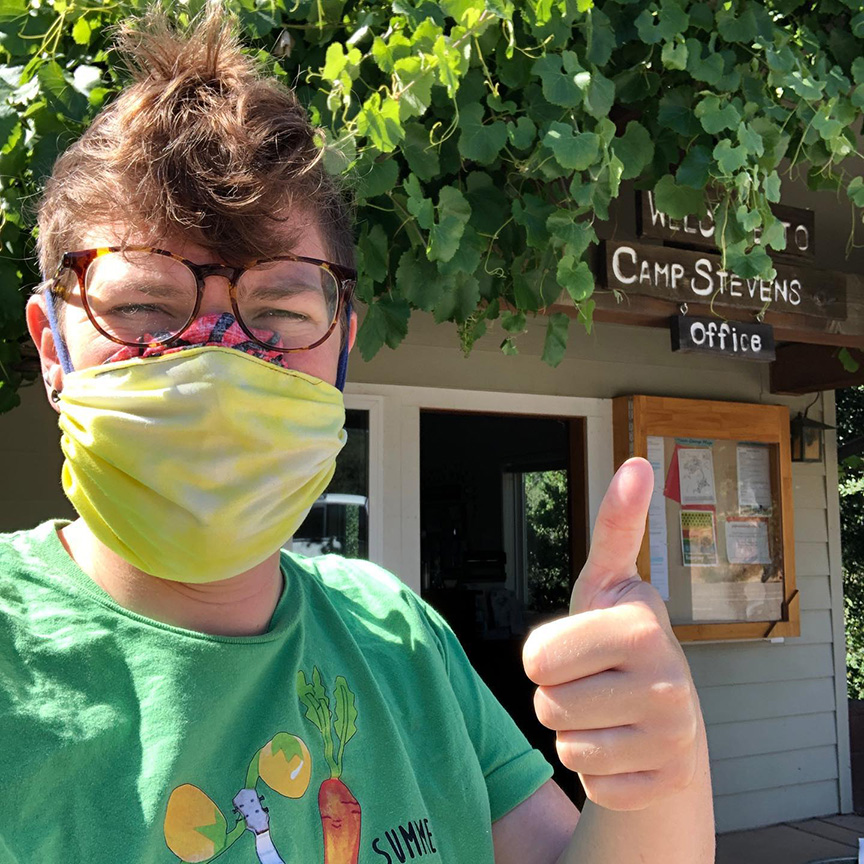
Camp Stevens has suspended regular camping programs this summer, but is open for families and small groups to enjoy for day trips and weekend getaways. Photo: Hannah Wilder
[The Episcopal News] – Glenda Middleton has been instructing eager youngsters online in the fine art of growing gummy bears and making ice cream, observing chemical reactions while creating faux volcanoes and slime, and considering the serious issue of climate change.
“In addition to a mini-science camp, I am leading a book club, and we’re reading Greta Thunberg’s book, No One is Too Small to Make a Difference,” said Middleton, an intern serving a Jubilee Year as an instructor for the Neighborhood Youth Association, a non-sectarian institution of the Diocese of Los Angeles since 1906.
“The students are engaged. They show up. They want to learn. They want to participate in activities while they are still stuck at home,” she said. “In our group discussions, we are talking a lot about climate change and what’s amazing to me is how much the students are taking in and understanding about it. They are connected to that and want to learn more about it. They want to engage,” Middleton said.
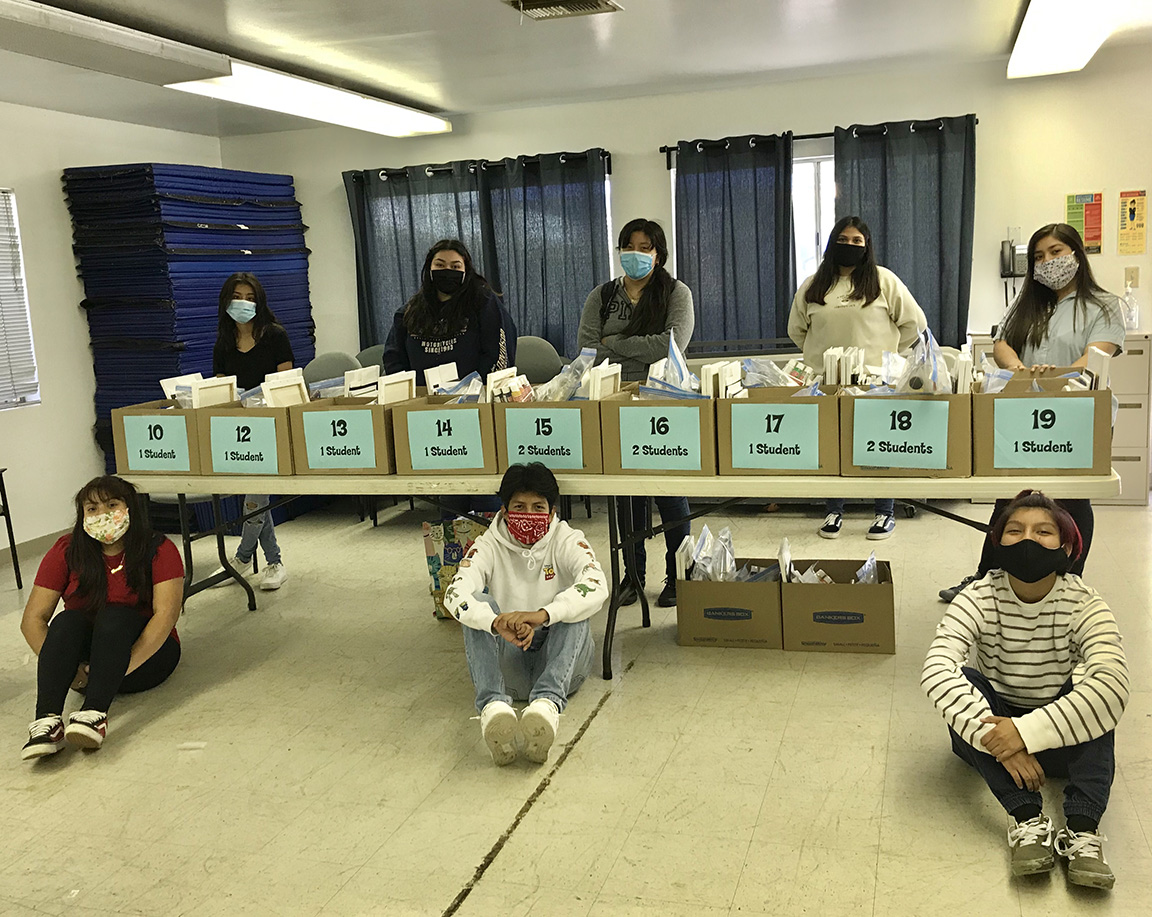
Student leaders at Neighborhood Youth Association pose with completed boxes of supplied for younger pupils taking part in summer programs. Photo: Sonia Hernandez
Summer fun at Southland camps and activity programs has morphed in the age of the COVID-19 virus into a variety of creative online and in-person activities aimed at preserving a traditional focus of enriching and supporting young lives.
“When the COVID-19 shutdown began, NYA immediately went online with tutoring, mentoring, and scholarship interviews that are part of the agency’s work of 100% college placement for high school seniors,” said Bob Williams, NYA board president and canon for Common Life for the Diocese of Los Angeles.
“Resilience is already in the toolkit of NYA students and families, all of whom are rising above challenges created by low income, now worsened with employment limited by the pandemic,” he added.
Similarly, in El Monte, the Doris Danns Kids Campus has continued to offer a free breakfast and hot lunch, in addition to an in-person K-8 program including arts, computer camp and other activities.
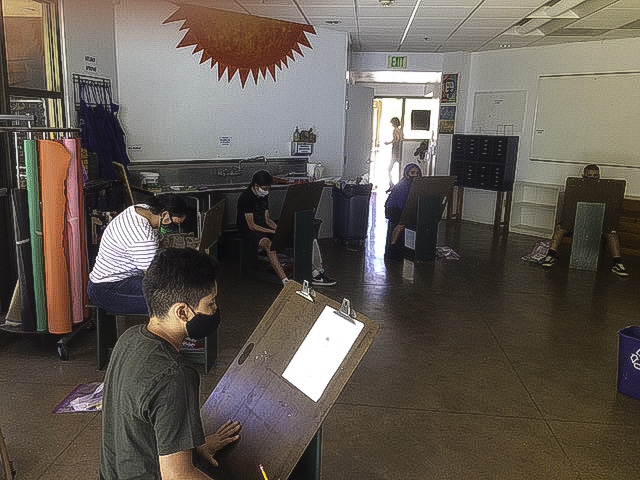
Students take an art class at the Dorris Dann Kids Campus, part of Our Saviour Center in El Monte. Photo: Our Saviour Center
“The first week, the children didn’t know how to act,” recalled Jane Fall, executive director. “They were very quiet. They’re used to being next to each other and, engaging with each other and we have them six feet apart.
“We keep reminding them not to get out of their chairs. It was a little bit hard the first week, getting them to know how to behave, that it’s okay to be a kid, but there are some limits to what they can do. Now, they totally understand it.”
The program runs through August 10 and the students, Fall said, “just like seeing their friends again. They feel safe here.”
The center is observing the necessary COVID-19 guidelines, like social distancing, wearing masks, taking temperatures, daily sanitizing classrooms after each use, and reducing class size while remaining “completely dedicated to fulfilling our mission to share love, hope and resources with our neighbors in need,” she said. “We know that parents really need additional events and opportunities for children.”
Fall estimated that 30 to 40% of families served by the center live at 140% below federal poverty guidelines. The U.S. Department of Health and Human Services classifies a family of four with an annual income of $26,000 or below as impoverished.
“We want to continue to be a resource to the community in a very trying time for everybody, so continuing to have children’s programming is right at the top of our list,” Fall added.
While attendance is down — about 40, compared to 160 at the same time last year — enthusiasm and energy remain high, she said. “We did a little survey of kids and parents and most said they just like seeing their friends again … that they feel safe here.”
Because of the pandemic and resultant stay-at-home guidelines, the center hopes the program “will give children an opportunity to come out of their homes and interact in a safe manner with other children. We think this is going a long way to restoring some normalcy.”
One hope is to find kid-sized face masks, she said. “Although, the kids usually show up wearing their own.”
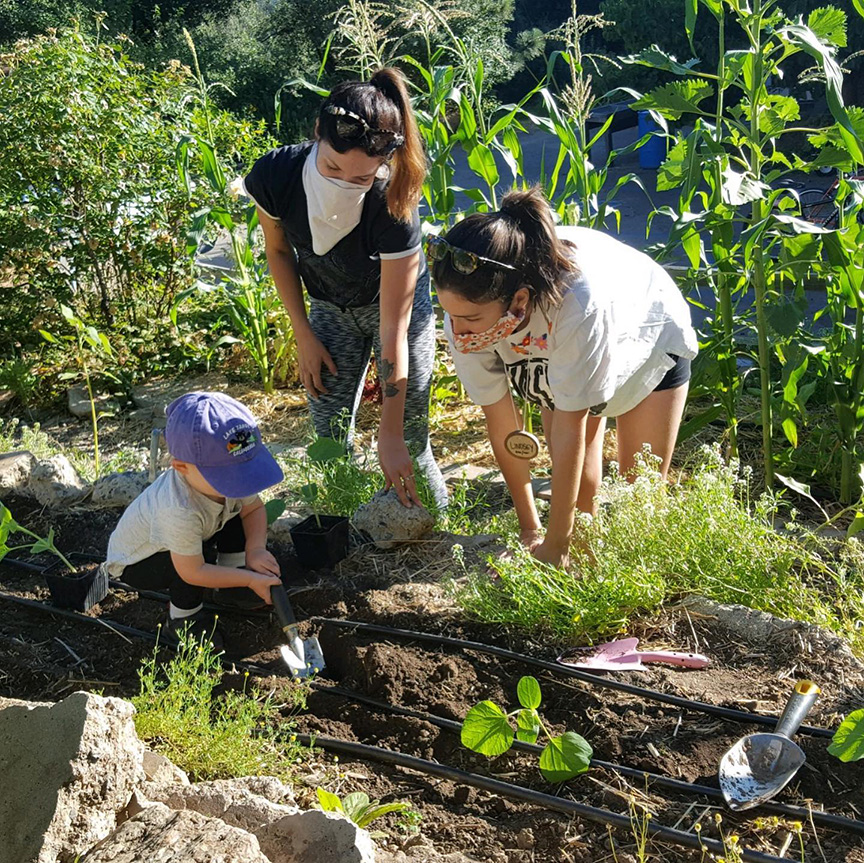
A very small camper learns about how to look after a garden at Camp Stevens. Photo: Camp Stevens
Camp Stevens
Julian’s Camp Stevens — a ministry serving the dioceses of Los Angeles and San Diego — is offering both online and in-person camping, swimming, hiking, nature breaks and even singing opportunities, according to executive director Kathy Wilder.
The traditional singalongs are “intended to hearten people,” she said. The invitation to belt out “If I had a Hammer” and “Country Road” and other campfire songs has been moved to 5:30 p.m. Thursdays on Facebook Live and Instagram Live. Meanwhile, the camp’s songbook is being updated and available on the website, she said.
Tent camping is available “if folks want to come on their own and take part in our meal service,” Wilder added. “Camp Stevens has always been a place to come to relax, to take a deep breath and heal and rest.
“It’s weird, for the first time in 52 years, we haven’t had summer camp. We’re basically starting to have family camps and overnight guests and day youth programs.”
In the age of COVID-19, social distancing and face masks are required, and food service is no longer indoors.
“We’re eating outside, limiting tables to one household each, and spreading out to eat across the lawn and patio,” Wilder said. “Food is served only by the dish crew, and masks are worn until you’re seated and eating. Pretty much the only thing that hasn’t changed is our wholesome, homemade, delicious, primarily organic and local food made with love.”
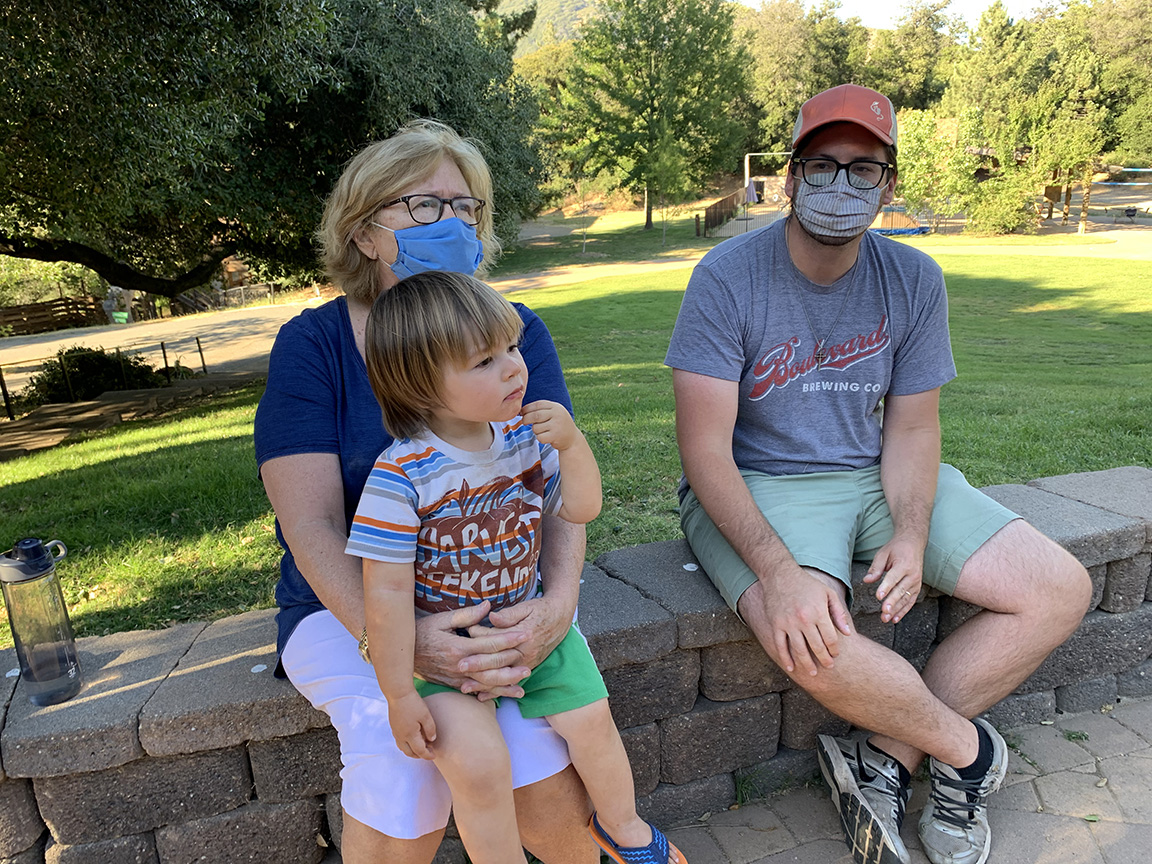
A family relaxes near the dining hall at Camp Stevens, which is open for day trips and socially distanced weekend getaways. Photo: Camp Stevens
Visits to the camp have averaged about 30 people for the past few weekends, between 25% to 35% of capacity, Wilder said.
“And then we’re having days people come up, just to hike at the same time, so that’s a really nice option for folks who are close enough. When people are out with their family groups, they are able to take their masks off on a hike. But they can’t do that at the pool. Everyone has to wear masks and social distance six feet apart.”
For those reluctant to venture out, online lessons are available on the camp website, both for purchase and for donation to others. Fall programming will also be available online.
After a four-month suspension of services, the camp reopened with stringent safety protocols. “That has been our number one concern. How do we do the work of retreating and outdoor healing and activity when our work is to bring people together? How do we bring people together in the most safe and thoughtful way?”
She added that: “We have had no cases [of COVID-19], including our staff. When it comes down to it, we believe deeply in making sure that Camp Stevens is a place that’s going to be here in the future. But, even more importantly, that we keep people safe. And if they are going to be here, they are going to be safe.”
Added Wilder: “We’re far, but sending our love to everybody. We know it’s hard. So many kids have their hearts broken that they can’t be here. We are working really hard to make sure we’re here and able to take kids next summer, as much as the world lets us.”
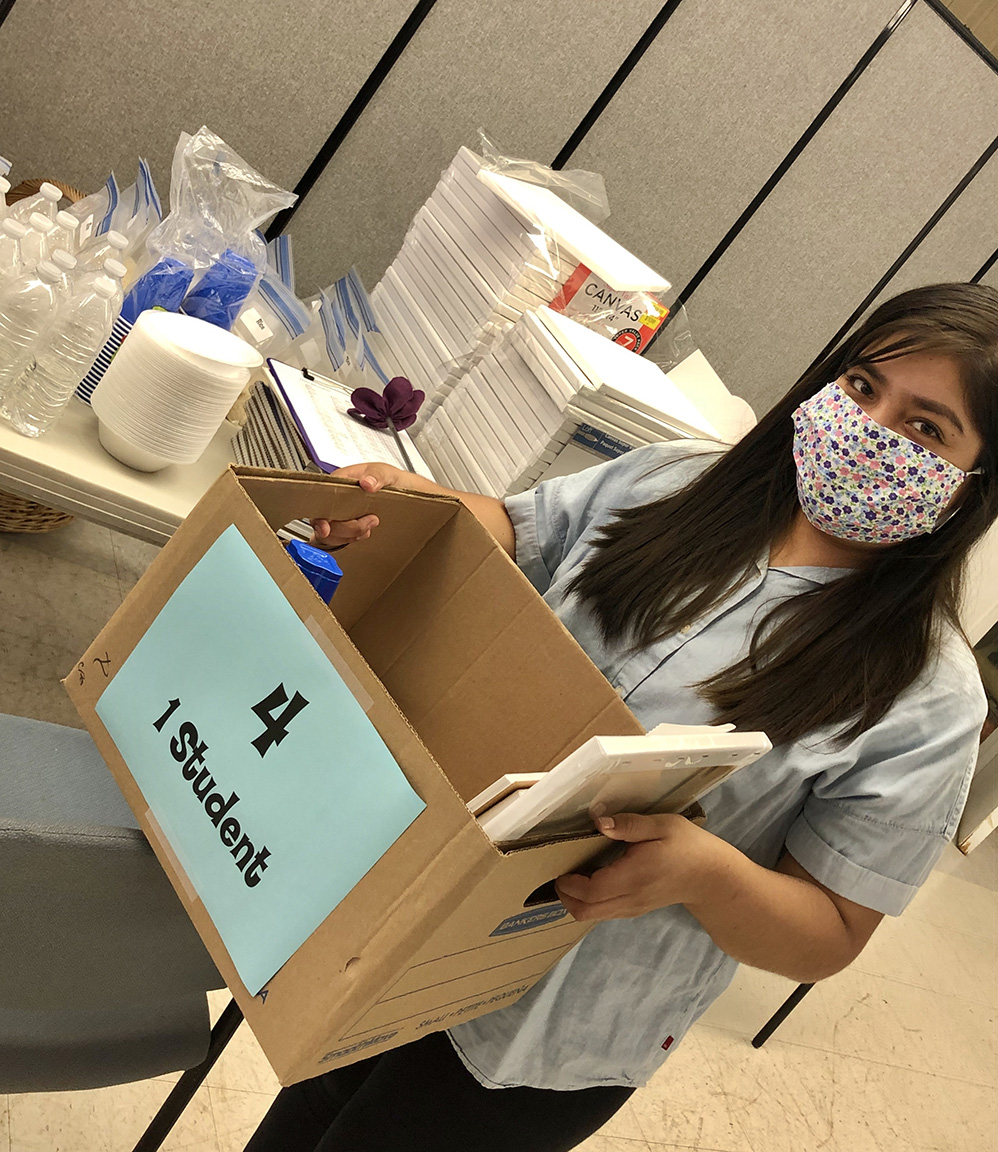 Neighborhood Youth Association
Neighborhood Youth Association
In preparation for the summer program, NYA youth leaders packed books, art supplies, skill-building worksheets, “self-care” packets, poetry lessons, and much more into 21 to-go boxes for drive-up distribution to NYA’s elementary and middle-school students.
Classes began July 6, and the virtual camp follows the tradition of NYA’s high-school-age Youth Leaders presenting weekday activities for the younger students, with the whole program supervised by NYA instructors and staff. While on-campus gatherings are suspended indefinitely, NYA’s vital mission of college-preparation and placement continues online and by phone, thanks to technology and the dedication of students and staff.
Middleton said there have been “a few hiccups” along the way with internet access for some of her 26 second- through eighth-grade students. Classes are held Mondays, Wednesdays and Fridays, from 9 a.m. to 3 p.m.
Among the challenges of online learning is attending to individual student needs “and that is amplified. Even being in person, it was difficult to attend to everyone’s needs.
Now, being virtual, it’s ten times harder. Students really need guidance at this point, especially students who don’t have good wifi.”
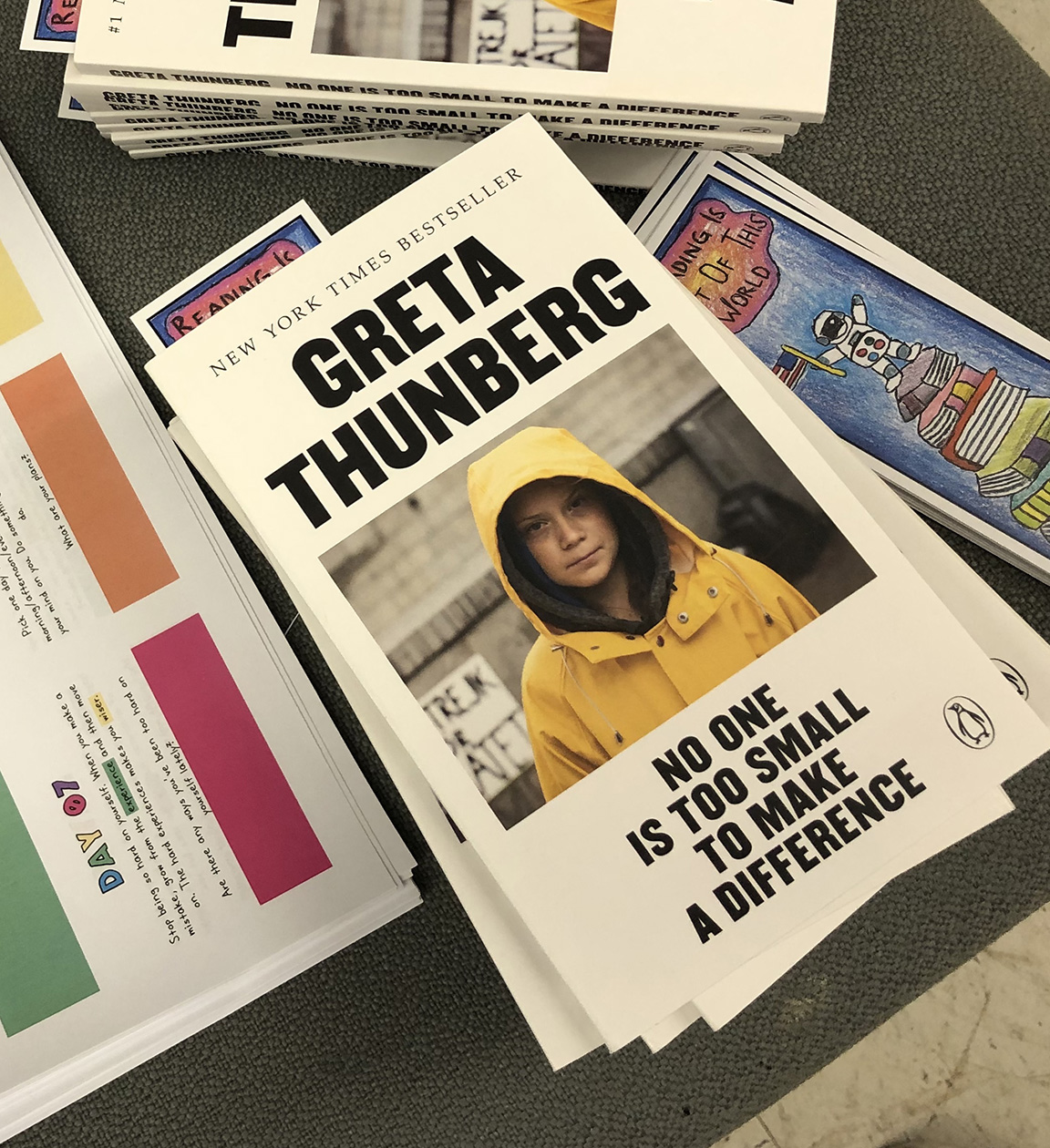
NYA’s summer students are taking inspiration from their near-contemporary, 17-year-old Swedish climate activist Greta Thunberg. Photo: Bob Williams
Even that becomes a lesson, as “we’ve been working on patience,” Middleton said. She added: “NYA is not the wealthiest nonprofit agency, but they have pulled out all the stops to make sure that summer camp and just our abilities to give and our resources are extended to all of the families and that is so crucial.”
Pre-pandemic, “we had a lot more interaction daily, when students would be picked up. Parents would come say hi, ask how students were doing or how they could get more help in a certain area. We have tried to be in touch with families who have internet issues to see if we can assist their connectivity.”
Middleton, whose internship is concluding, said her biggest regret is “I am not going to be able to see my kids or talk to them and tell them how much they mean to me and how they shaped me through the year. That’s difficult for me.”
